Interview #2: the Lore of Hana Stretton, Part 2
wildfires, floods and being alone to feel connected
When Hana moved back to Australia, she uploaded sketches of songs to a burner sound-cloud account called ‘Nora’s Bin’. Once again, it was supposed to be a low pressure project just to force herself to write, ‘little discarded doodles’ Hana wrote at the time. But like ‘The Thrill Of Loneliness’, these sketches started gaining traction, too. I remember being obsessed with a song with the word ‘ego’ repeating and repeating. It never made it onto ‘Soon’, and has been taken off sound-cloud, like all the other beautiful doodles. The songs that did make it on? ‘Ducks’, ‘Can I’, ‘Micalong’ and ‘Bid’s Animals’, to name a few.
C: Musicians are really economically contracted compared to twenty, thirty years ago, at least here in the UK. I’ve found it hard to have a band and a solo project. I’m trying to remind myself of this too, that everything happens in good time. It’s worth being patient. What you’ve made speaks to your soul, and it’s an amazing testament to your talent that you did it by yourself. And you can always have that big band project again, it’s never lost. It just didn’t continue back then. But it’s not lost. Does that make sense?
H: Yeah, yeah. Honestly, Catrin, my problem now…you know that anxiety in your belly that says, “no”. Someone says, “can you sing for us at Dad’s birthday?”, and your gut says, “fucking no”. That is a permanent state for me right now unless I’m completely alone. And by completely alone, I mean no phone, no internet, no people walking past. And that’s going to be so hard for me going forwards.
Hana recorded ‘Soon’ on her Grandma’s farm after she passed away, alone, in the middle of nowhere, looking after it during the Australian wildfires of 2019. This felt like the first time the direct effects of climate change were catapulted into Western public conscience (and subjected to a lot of denial, still). ‘Bid’s Animals’ is a direct reference to the farm animals she took care of, and the nickname of her late Grandmother.
In her youth, animals were lovingly named and personified after their human counterparts. At first, ‘The Captain’ makes you think of a leader archetype manning the farm, or someone out at sea, to then be later explained with another song title, ‘Captain Was A Cow’. In this simple way, just the choice of song names subvert all expectation of hierarchies.
Hana told me that Captain is a bull the whole town was named after, ‘Captain’s Flat’. He liked to escape his pen to go to this little flat in the hills. They always found him there, so they called it ‘Captain’s Flat’, and then the town was later built around it. Her song names and lyrics appear cryptic, so softly sung underneath soothing, structure-bending textures, when really they are so direct, so to the point. Hana finds power in what should be obvious and simple, but rarely is. The history and humanity of things.
H: Human beings have so much energy coming off them…it throws me off course. If I have an idea or something, I’ll start thinking ‘it’s not good’ if I’m around others. You know, it’s that ego thing we’ve spoken about. The only thing that stops the ego is having no one around. And I’m going to have to work on that, moving forwards. I can’t move in a vacuum. It’s too expensive. The only thing I’m thinking is a van, because if I can go to a different river every night, and be completely alone…That’s an option. And I’ve been really lucky in the past, but at the moment, my body doesn’t want to give up being alone. I’m trying to tell my body, “it’s too expensive to do what you want”.
C: I completely get that.
H: I think I’m just hyper-sensitive, and so many people are. I just diminish and shrink around other people. I go, ‘what’s the colour of the walls?’ and try and melt into them.
C: I had to be around people and had to be in a band to get anything done. I always planned for both, the band and whatever I make alone to happen, but I’ve had to work…and all sorts has happened…I always imagined my future spent alone. I always thought I’d end up having a lot of alone-time, I always wanted it. And it just hasn’t happened that way.
H: It’s expensive to get to this egoless state, to make music in this pure form, and I’m so grateful I had Bid’s place, after she died, otherwise I never would have had that kind of space. That place is a real time warp from the fifties/sixties; a flat roof, a shag carpet, wood walls, no phone and no internet. When do you just walk into that kind of environment, and are able to live there for free? That was a completely random, amazing experience. But now, it’s like, okay, I’ve figured out what works -
C: - which is amazing! -
H: but trying to replicate it…now I’m like, wait. That’s not the world. It’s great that I know that, but what do I do? Do I move to the middle of New Zealand and find a cave?
We both laugh.
H: and collect berries and hunt a deer or something.
C: I can imagine you doing that.
H: Maybe I will. I think about it quite a bit. I bought a book on edible fruits and plants thinking I’ll get to know the Bush a bit better, but really I just want to make music.
C: I’ve been reading about this philosopher, Emil Cioran. It’s really bleak. He was quite a bleak philosopher. He basically said, ‘life is mainly suffering’. It’s mainly searching for the berry. I see music as these glorious moments. Maybe once every three years, even once every ten years…the stars align. Music is an expression of these moments of clarity. That’s what I hear in your record. If foraging for berries gets you there, why not? And I hate this model of infinite growth, the idea you have to constantly get better and bigger. Real life isn’t a straight line.
H: I’m so excited to talk to you. I haven’t spoken to anyone like this for months. I like this idea of living life in seasons. If you’re a bear, you’ll spend a season gathering fish and getting fat, and then you’ll spend a season under, hibernating. Is it worth going into the wilderness? I’m so down for it. But if at the end of years or years in the Bush, where I’ll have grown a beard…will I look back and think, “that was worth it”? Thinking in absolutes is wrong. I think it’s nice to think in seasons. I’d love to live my life, moving forwards, in a season of berry gathering, and another season in…hm. What would that be? Touching the earth, what’s real. Being with people. What do you think?
C: I love that. So much. It’s so weird you’ve said that, because I wrote a lyric recently and it goes, “can’t keep track of how many times I’ve had to change, like the seasons”. I think I had this idea that I’d go into a job, that I’d be like my parents. I’d have kids. And my life has been utterly wild - so not like that at all - so, so unstable. It’s been fighting bears, really. And our seasons are changing, they’re disrupted…changing weather. You can’t even plan for the future, and say I’m going to go into the woods, and pick berries forever. You don’t know what’s round the corner.
H: I mean, for a year, I didn’t speak to anyone.
C: How was it, not speaking to anyone?
H: Amazing. I didn’t feel lonely. I felt depressed sometimes, but never lonely. I did love going into Bungendore, the town closest to me. Such a waste of petrol, a terrible thing to do for the Earth. But I had to go and wave at people, to see them. I’d go wave to someone, and then go back. It really helped me to feel like, “hey, it’s another day, the world is still real, I’m going to touch it, and then I’m going to go back”. And that experience - that’s not going to be possible, anymore, the farms been sold -
C: The farms been sold?
H: Yeah. And that’s a bit of mourning I’ve had to do, of a place completely devoid of the anxieties of 2020, covid, death and destruction, social media, and pile ons. Poor us. How are we meant to get anything done?
C: Like seasons, I have to go through this whole cycle of, ‘use social media to promote music!’. And then I lose looking after myself, and I have to wrench myself from it. It totally takes me out of being here, in the moment. I tried to hand social media over to everyone else, but I guess it makes sense for me to do it. I keep bringing this back to me, because you’re my friend. I’ll try and keep it about you -
H: I’m honestly just enjoying having a conversation.
C: So you still had to go and wave at people. Was it seeing people in the town that reminded you you weren’t completely alone?
H: There was no TV in the house or anything. And the bushfires had just happened. I was in the house when the whole house turned black with smoke. There were loads of ‘the world is ending’ scenarios which happened in such quick succession. Also, floods! The roads were cut off. I couldn’t get out. I couldn’t get in or out to get food, or anything like that.

C: What did you do? to get food?
H: I just had to bunker down for a few days. But I didn’t have major anxiety, being alone. It felt beautiful to say hello to someone, and feel this weird…stillness. I don’t know what the significance of it was, but it was important, for sure.
C: That’s fascinating, how in one of the most anxiety inducing years we’ve had in this generation, even our parent’s generation, you didn’t feel anxiety. You must have felt some, right?
H: No. I really didn’t. I felt so fucking light. So many people would have, if they were in my position. It was this incredible…distancing. And that was my privilege. Even though bushfires were literally on my doorstep, there was an ocean between me and the world. In modern life, we feel the world on top of our heads, building and building. So to feel that much separation, with no internet, you feel like there’s an ocean between you and everyone else. And it’s fucking great.
C: That’s so poetic. What you’ve just said really changes the way I think about things. It’s really interesting to hear a perspective where you weren’t using social media, or cramped in a city, like I was…I think that really says something about how we’ve structured society. Even in one of the most anxiety inducing years, if you are truly living in nature, taking care of animals, living by yourself -
H: yeah, but it’s so much privilege. That’s the thing. How do you talk about it? I’m talking about it to you, but like, you can’t say, “oh, why doesn’t everyone just find a farm with no internet somewhere”.
C: I hear that. But that’s not what you’re saying, is it? I think you’ve discovered something. Most people who go on adventures, most people who do music are privileged. You could argue about privilege endlessly…being in a first world country…but I personally find what you’ve done really profound. It’s my dream, and I doubt I’ll ever be able to do it. But I’m not looking at you, thinking, “so privileged”. I’m looking at you and thinking, “thank god someone did it”. I’m thinking, “that’s such a profound experience, I’m so inspired by you”. And I think that approach is how to get rid of ego. Just being happy for other people. I’m trying to do that more, now.
H: It really transformed my life. But coming back into the real world…I’ve never been more depressed. Moving back to Melbourne, and seeing myself tumble into the weeds of despair and dread…and funnily enough, terrible agoraphobia, has felt awful. Which is so funny, because if I compare myself to me back on Bid’s farm, having not spoken to anyone in a year…and every time I came out to say hi to someone, I felt so much happiness and love towards people, I would connect with literally everyone on the street…to the person moving to a city after that, scared and depressed. The ego floods back in. And I literally don’t go outside. I don’t see anyone. Isn’t that strange?
C: I’m at a loss for words. I get everything you’re saying. I wrote a lyric about agoraphobia, recently. When I lost the flat I rent, I wrote something like, ‘so scared to leave the house, now I don’t have one to leave’.
H: Why do you think some people feel agoraphobia?
C: I think…and this is a bit depressing…but I think generally, to cope with the destruction of our world, people live in a lot of denial. I think it takes denial to leave the house. Some denial is necessary, otherwise you just won’t live. You want to experience life while it’s still here, in this form, you want to go to parties, to see people, be in the moment. But I feel like I struggle in those situations, because for whatever reason, I can’t live in denial.
I pause.
C: This is such a deep conversation.
H: It is us!
C: I think…when you’re a highly sensitive person, for whatever reason, there are so many theories. But…it’s so hard to pretend you’re not totally devastated by modern life.
H: I don’t know about you, but I can’t…I think I have a phobia of David Attenborough and Planet Earth. I’m not really the kind of person to run away from sad stuff, sad songs…but fuck me. Planet Earth scares the shit out of me. I get so scared. And this is part of my own denial, I guess. Or maybe it’s the opposite. Having your reality seen. Seeing gorgeous things and being devastated by them, because you know they’re dying. An advert came up for him, and I started bawling my eyes out. Living in a city, living online, we’re not faced with it.
C: We’ve created a bubble for ourselves. That’s so funny you said that - I had some kind of stomach bug, and I thought, I’ll put on David Attenborough. That will soothe me. He hasn’t spoken about global warming yet, it’ll be the soothing nature stuff. And then I picked the one documentary where he finally covers it, he finally goes in hard about global warming after years of criticism for not doing that.
H: And then you threw up everywhere.
C: I didn’t have the strength to get up and switch it over. So I was lying there with norovirus, completely immersed in how human beings are pieces of shit.
H: How can we be soothed by it, though? Seeing the most devastatingly heaven-on-Earth type shit, like…no one in their wildest dreams could make some of this nature up, if they hadn’t seen it…and I’m terrified of it, so scared of it. I just feel like, “when is that going to go?”
C: It’s like grieving something before it’s gone. I wrote that as a lyric recently, too. You can’t live in a constant state of grief, your body won’t let you. It has defence mechanisms, and one of them is denial. Another, I think, is depression. I think depression is a weather system for your body, telling you something is wrong. And we’re now all in this constant, un-resolving storm. And it’s hard to live in denial of that. It’s completely mental, actually.
H: Sorry, I’ve gone completely off course.
C: No! This is why I write.
H: I never talk to people like this, but I’m shaking with enthusiasm. That’s why I’m totally going off course. We don’t do it enough. And speaking about denial, I’m starting to understand why I run away from Planet Earth, why I’m agoraphobic. I’m living in my own denial, for sure.
C: But you can’t not. You have to function in modern society. It’s like ‘Into The Wild’. He literally dies! We’re domesticated. You are someone who has inspired my so much with the environment, and what I’d say is, it’s not your fault you have to drive a car to see people, it’s not your fault you have to participate in it. You’ve really tried. You’ll find a way…oh god, I feel like I’m trying to be Buddha. But you’ll find your way back to that egoless place. It’s not you choosing to not be there, it’s that you had to move to Melbourne. We have to exist in this.
H: I don’t know how you feel about music making, and stuff. But I’ve always seen music as a creature inside me, a little worm. If things are silent, it worms its way up. It says, hey, I can come do something. And then when there’s people around, it says, “no. Fuck you. I’m not coming out.” The worm can only rise if there’s silence enough to listen. People used to say to me, you live in the city, that’s amazing. You should be making so much music. When I was in Melbourne, I did not touch a guitar, a mic, a piano, for a year and two months. Nothing. Not once. I didn’t sing once. I didn’t make anything once. Which was a stark contrast from coming out of a massive creative period…it was so clear it was the fact I had neighbours. Driving into Melbourne, I felt million voices as a wave spill over me. And it just stayed like that until I left.
C: I had that this week. Every noise hurt. Now I’m spending half my time out of London, half in, I realise how ridiculous it is. And some people spend their entire life with that noise.
H: My whole body was like, we might have been able to do this before, but no. We’ve changed. We can’t do this anymore, this is it. We can’t live in a city. Now I’m like, do I never live in a city again? And this idea of seasons came up. I’ve just got figure out how to make some money. Fucking money.
C: I just feel like it’s gonna be what it is. Make money when you can. Make sure you’re constantly focussing on the best of yourself. Music. Money will happen, or it won’t, and you’ll figure out a way. God, it’s so nice to talk to you. It’s hard to find people to talk to about this. We’re on a very different path to most people. I’ve loved this conversation so much, I’ve tried not to steer it too much. Do you mind if I ask you some music-y questions?
This conversation has weighed on me over the past two weeks in the most beautiful way. I was living in my own denial, and finally being able to speak in this way with someone, especially a close friend, took the shame away from it. I understood and related to everything Hana said. And that is the profoundness of friendship, I think. As terrifying as everything is, it is imperative we have friends, that we don’t feel alone through it all. It is beautiful to feel seen. And in that way, it is ironic Hana feels seen when she is alone. But I really get that, it really makes a lot of sense to me.
C: How did it feel to finally trust yourself? I remember you said you had to go to different producers and try to make the record again, before you realised the thing you made was good enough.
H: I don’t have a good way of answering this question…on paper…but I really needed a man in a ‘suit’, with a ‘producer hat’ to say, “this is good enough”. I went to Nick, from Little Lake [who co-released ‘Soon’], who said…it’s fine. Release it. I had zero confidence. I never would have told myself it is was okay. Just from that one moment with Nick, I feel like I’ve got a lifetime’s supply of ‘I can do it myself’.
C: you improvised Come Home walking to a beach on your iphone, right?
H: No! I wrote that song on piano. It’s completely different on piano. And then that day I decided I was going to sing it during a walk to the beach.
C: It’s so simple, but so hard to do. You layer up harmonies free-time.
H: It was nice that my Dad recorded that moment.
C: Your Dad has been so important to you, hasn’t he? You’ve always played music with him.
Hana tells me in a subsequent email that this picture is of “my Dad (right) Pip and his brother Jamie. Jamie played in the 80’s band ‘The Mood Section’ and his mullet would be the envy of anyone these days. I made my music in the same room as this one…I found all of Jamie’s old cassettes, heard him at 21 trying out new songs on a 2 track just like I would. And I felt that although he had died young..that he was there in some way; kindred spirits.”
H: He’s very much like me. We even look the same. He’s the most incredible natural harmoniser I’ve ever met. He’ll sing along to a song on the radio, and have no idea what’s happening, but his harmonies are incredible. All of my harmony stuff…I got from him. I think honestly, I don’t know if you feel the same way, but, I do wonder whether music is literally just harmony. If you figure out how to do harmony, you can just…do music. Sometimes I’m making music, and I’m just like, “this is tetris”. I’m so grateful for my Dad. I don’t have to think about harmony, it just happens. That makes everything so much easier. All my music is a harmony on harmony on harmony on harmony. All it is is my Dad in the car, singing harmony.
C: That’s beautiful. That’s such a beautiful way to put it. I recorded my Dad whistling the other day. I sampled his whistle into a synth. It sounded really weird, ha. And I showed him it, and I said, can you harmonise with your own whistling? He says he’s not a musician - he instantly did a harmony. And actually, growing up, I heard my Dad whistling harmonies to the radio. If I really think about it, that’s probably how I learned harmony, too.
H: I have this dream - I’ve never really taught anyone before, musically or anything, but growing up I never really had a constant music teacher…and if I had someone, when I was younger…and I guess I got this through osmosis with my dad…but I would at some point love to say to a kid, play a note, and play around with the other note, and then see what sounds nice with the other note. Then, add another one. And just say…really, that’s it. That’s all music is.
C: I was teaching at school, and this other teacher is really classically trained. And he was moaning to me about another teacher using their ears. And I thought…don’t observe my lessons, please.
Hana sent me ‘Soon’ as a whole track last year, half an hour long. “Does it need splitting up?”, I remember her asking me. I remember saying no at first, but then saying, yes, if you want to put it through the music industry. What do I think about that now? I just think Hana is saying something, and everyone will sit up and listen regardless of how things are packaged or how musicians are put down. Art will live on in whatever way it can.
I didn’t feel like I covered her music making process enough. So I asked her some extra questions via email:
C: Improvising is a huge part of your sound. How did you improvise growing up?
H: I always start with visuals first, either a made up scene or cartoon in my head, or an experience I’ve had. Right now, I'm building music based on visuals from Katia and Maurice Krafft's incredible volcano visuals.
C: Do you find that cassette tapes are a more eco-friendly way to make music?
H: Perhaps...I do tend to recycle my tapes, recording over and over and over until the spine snaps off. When I started out, the gear (4-tracks etc) and the tapes weren't expensive. That was the draw of it. But suddenly they're wildly expensive? Once my current tape machines wear out, I might not be able to continue recording the way I love.
C: How do you weave sounds together in Ableton?
H: I pretty much never take anything out. Every terrible musical whim that comes out...I keep! 90% of my files stay on at -45, like a bed of sea creatures crunching underfoot.
C: What are your favourite lyrics in your songs?
H: I’m not a lyricist. I love to write stories and love letters, but not lyrics. If I have lyrics at all, they tend to be personal reminders. I'm not one to learn from my mistakes so they act as a musical tap on the back saying “remember? that sucked. Don't do that again”.
“Where’ve you been? Crawl in under my wave. And that’s it…be on” - Changing Weather
If you’d like to support Hana:



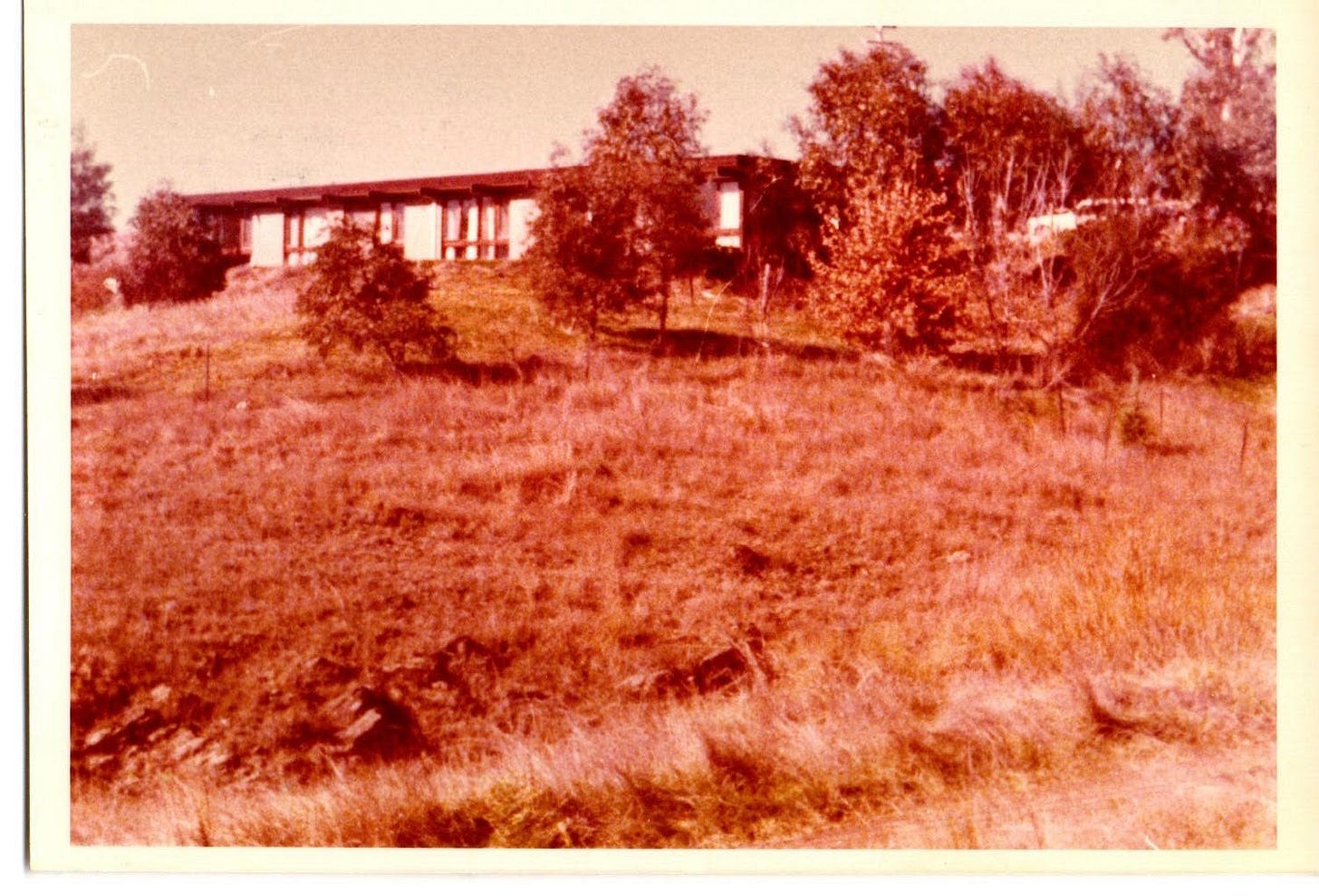
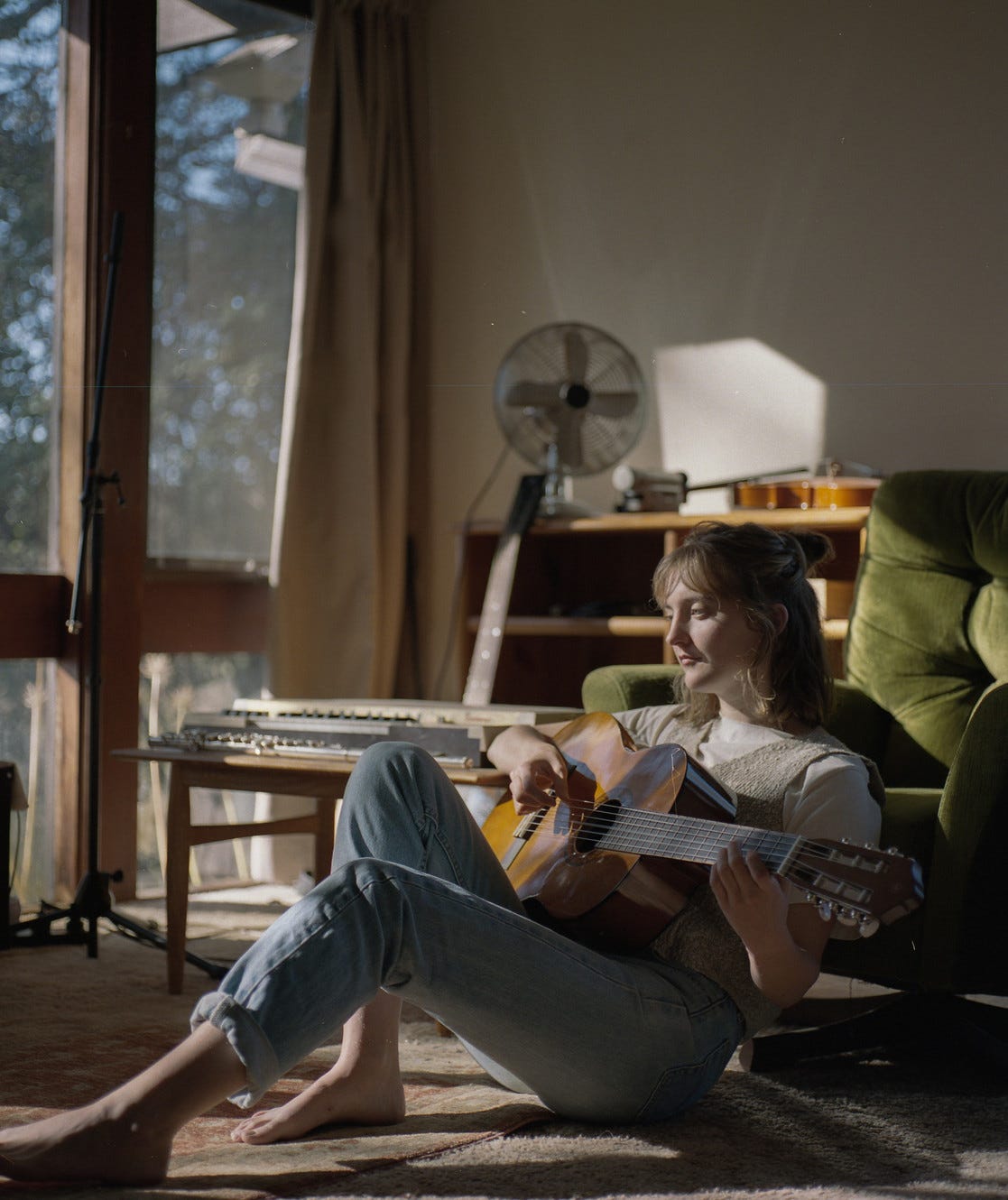
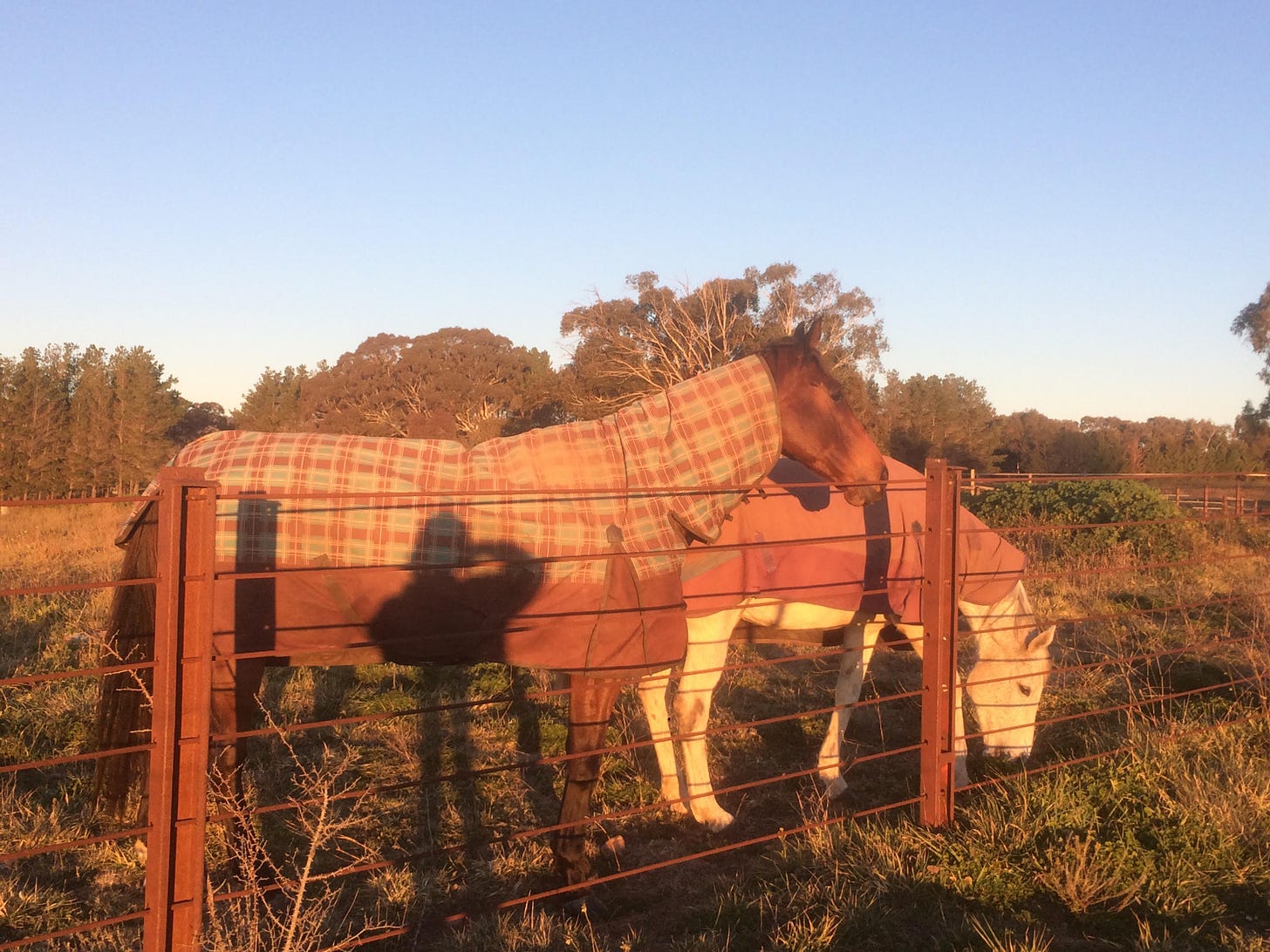
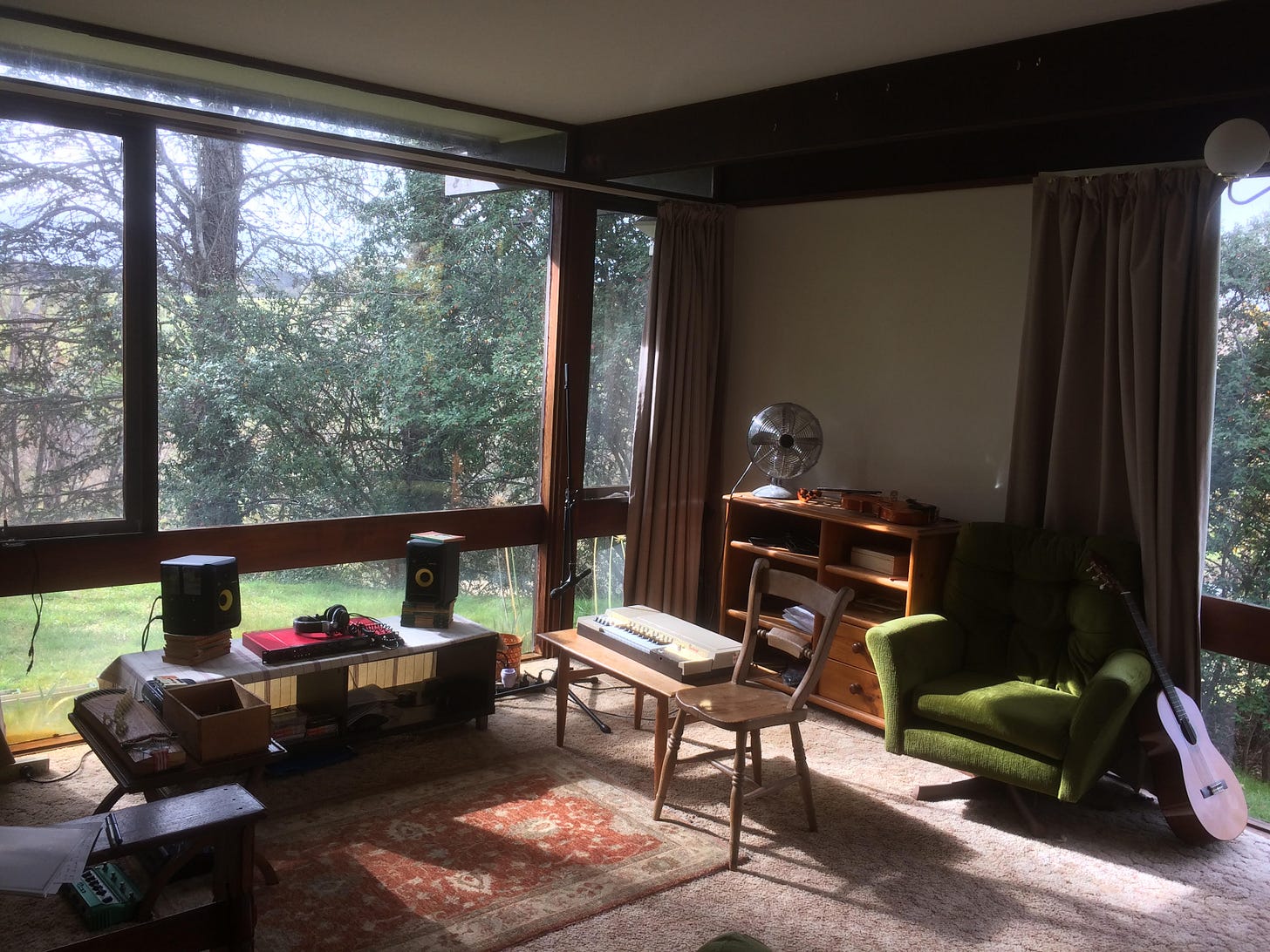
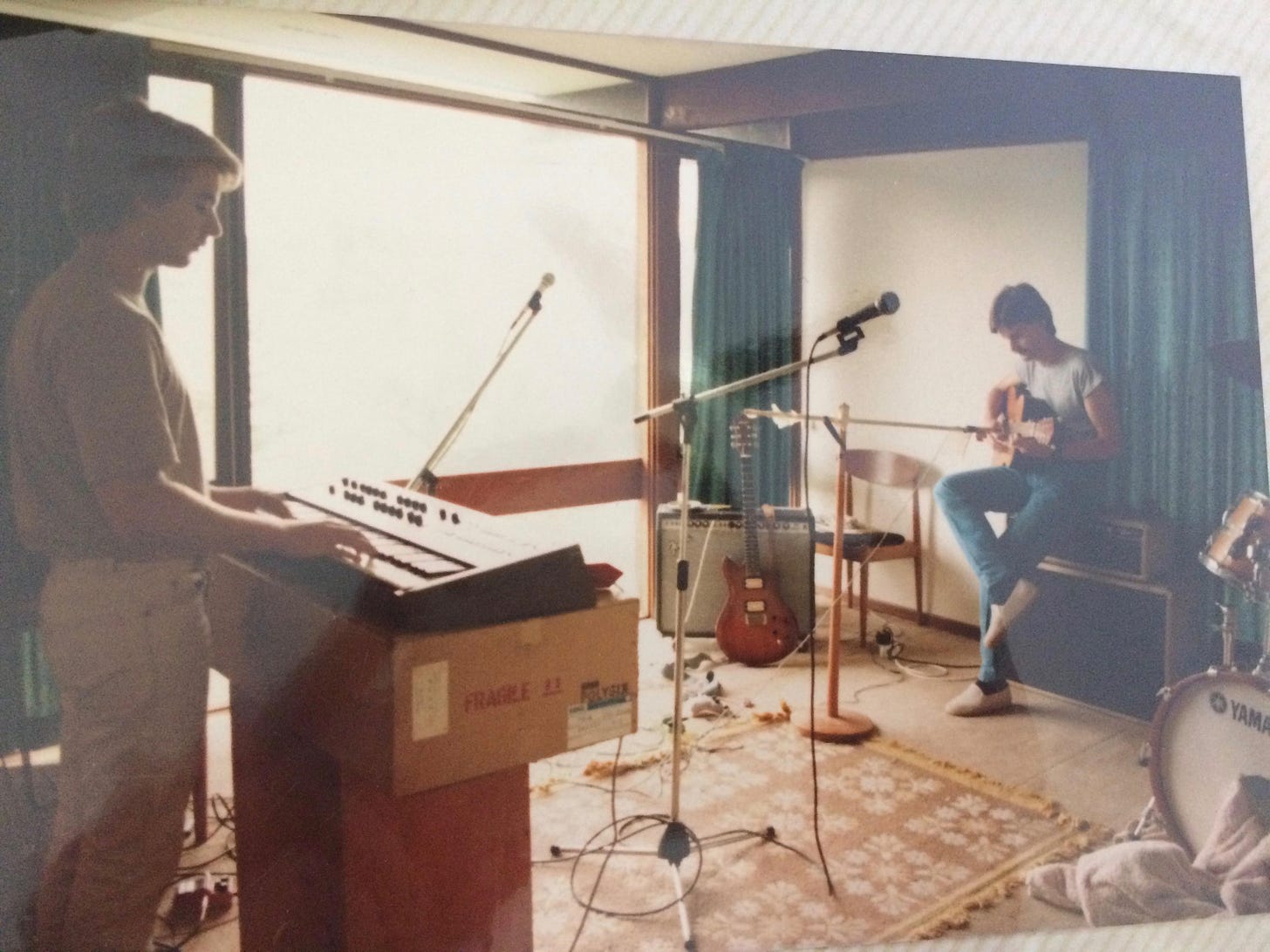
Fascinating stuff. The world could use more of Hana’s art